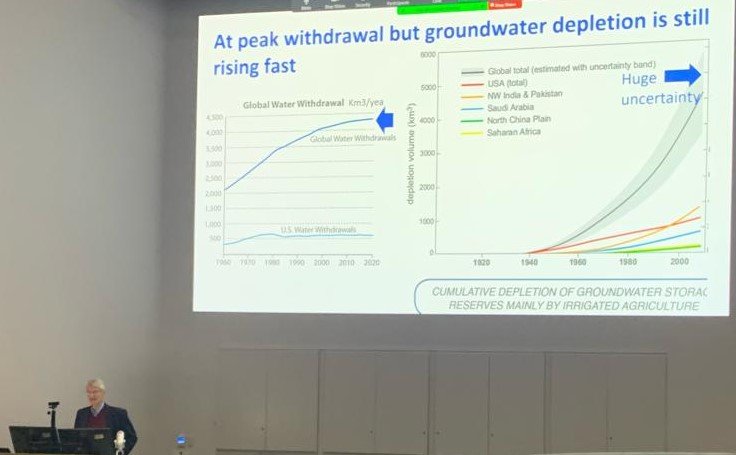The John Cherry Presentation: Groundwater Paradox
The Groundwater Paradox
By: Rory McPhail
We open on G109, the Irving Auditorium, people sparsely distributed around the room enjoying the luxurious seating. As per usual there are a few people up front navigating the treacherous waters of connecting a laptop and opening a presentation while broadcasting on Zoom. While this may seem like just another Tuesday in the auditorium there is one vital difference: the audience is genuinely interested in the presentation (well I suppose most of the audience, excluding the students only there to receive the extra credit given in the hydrogeology course). On Tuesday February 7, esteemed hydrogeologist, John Cherry, held a presentation on the importance of groundwater and its global impact. John Cherry, not to be confused with Don Cherry, the former Hockey Night in Canada host, is a globally renowned hydrogeologist who has made many contributions to the field of groundwater and hydrogeology. The only similarities between John and Don are their last name and age, John does not share Don’s flamboyant dress style (unfortunately) and more notably, John Cherry was the recipient of the 2020 Stockholm Water Prize.
The lecture he gave on Tuesday night, titled “The Global Water Crisis Paradox: Groundwater, Food and Poverty” has been given at many universities in Europe, Mexico and Canada. Groundwater is one of Earth’s most important natural resources. 99% of all liquid freshwater is groundwater and approximately half of humanity drinks groundwater. Water is vital for societal stability and quality of life. Yet many nations struggle to provide and maintain this basic resource. India is one of the largest ground water extractors in the world yet there is large water insecurity in their nation and farmers are impacted the most by this insecurity. Iran is currently “facing a state of water bankruptcy” due to over-exploitation of their water resources and increased salinity. According to some, lack of water was a leading cause of the Syrian civil war. This dearth of water has increased because refugee camps are struggling to provide adequate water to the growing number of refugees. Even here in Canada, millions of First Nations peoples do not have access to safe drinking water due a lack of infrastructure. Cape town, Sao Paulo and California have all suffered short droughts over the past few years with a potential mega drought on the near horizon for California. During a drought, groundwater becomes even more important as it is the only source of fresh water.
Despite the obvious importance of groundwater, it has been globally mismanaged. One third of the world’s largest aquifers have been depleted due to over pumping and large aquifers in the United States are currently on a trajectory to be over pumped. One of the main culprits in the current groundwater mismanagement is big agriculture. 40% of the global agriculture process is irrigated and 70% of the irrigation water used is groundwater. These agriculture practices are highly inefficient, unsustainable and in the long run will deplete aquifers that are vital to global prosperity. Many experts predict that we have hit “peak water” use. Peak water is the amount of water available on the planet. Yet total water use must decline as aquifers that have already been depleted contributed to the “peak water levels”. Despite this groundwater continues to grow in popularity and use. The projected groundwater use increase by 2050 according to UNESCO is a physical impossibility. Given the current volume of groundwater and the depleted state of the aquifers, there simply is not enough water to satisfy the growing demand.
This takes us to John Cherry’s paradox: groundwater is over pumped by these large agricultural corporations and nations. While at the same time it is underutilized and under pumped by small nations and communities. Approximately one third of the world lives in water poverty. People in these conditions must spend large amounts of time walking to the nearest source water, which are often contaminated and unsafe for drinking. So as a society are we up the proverbial creek without a paddle? According to John Cherry there is a solution to this groundwater paradox. To stop the over pumping of aquifers, more sustainable methods of agriculture must be developed and implemented. More efficient irrigation methods also need to be implemented to lessen the draw on the aquifers. To solve the issue of water poverty, groundwater wells need to be installed all over the world. There is fresh groundwater nearly everywhere in the world that could be used by communities suffering from water poverty. There are many well drilling methods that could be used to install small wells that will satisfy the needs of small rural communities. So essentially, we need fewer large scale groundwater operations and more small-scale community groundwater operations. According to John Cherry, “we are in the process of civilization collapse unless we make some changes”. In the battle against climate change and an impending civilization collapse, groundwater has a vital part to play. However, we still have time to modify our groundwater use and there are many new technologies emerging in agriculture and hydrogeology, meaning we’re not up the creek just yet. Although I suppose if we do end up the creek without a paddle, there’ll be plenty of water…
To learn more about the field of hydrogeology and groundwater check out “The Groundwater Project”, a free online resource created by John Cherry.

